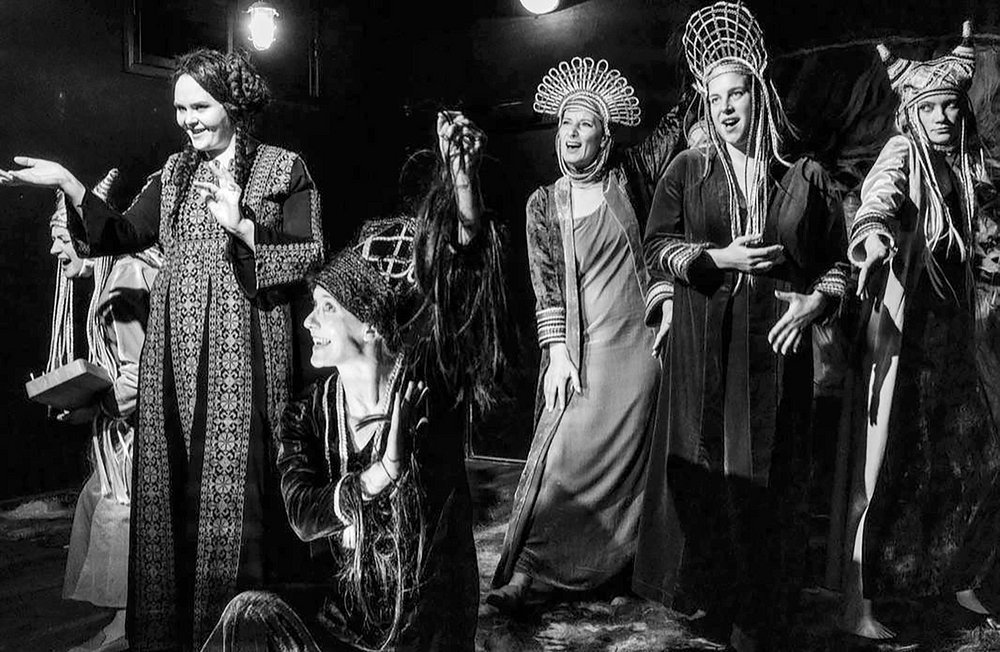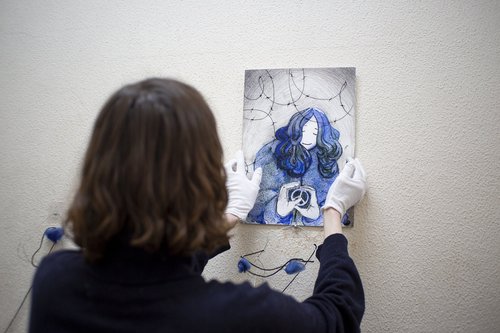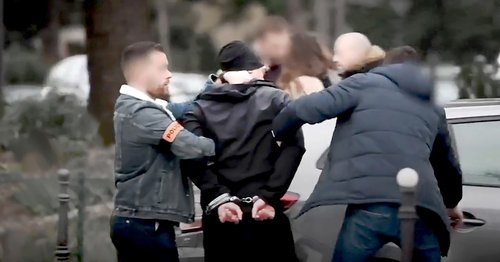From the Courtroom to the Stage and Back

Finist the Brave Falcone. Scene from the play. Photo by Alexander Andrievich. Image from Soso Daughters website
In a high-profile case involving theatre director Evgenia Berkovich (b. 1985) and playwright Svetlana Petriychuk (b. 1989), a six year sentence has been passed in what is a real-life drama.
In Moscow, on 8th of July 2024, judge Yuri Massin announced a six-year sentence in a high-profile case that has attracted international attention. In 2022 a theatrical production ‘Finist Yasny Sokol’, directed by Evgenia Berkovich and based on a play written by Svetlana Petriychuk, won the Golden Mask, Russia’s most prestigious theatrical award, having been nominated in two categories. The following year, both women were arrested on charges of “justifying terrorism” and for a year were held in detention before their trial began. The court ignored Berkovich’s numerous appeals to place her under house arrest instead, because of her two young children. Berkovich was well-known as a critic of Russia’s actions in Ukraine, having written numerous poems on the subject which she posted on social media. A few days before her arrest, her poems were published in Israel.
Petriychuk’s play, named after a Russian fairy tale, tells stories about women who are lured into marrying ISIS fighters via online chats, and then travel to Syria to join their fiancé (ISIS is an organisation which is banned in Russia). Several monologues which were not part of the original script were added by actresses during rehearsal, revealing how and why the women fell for the promises of ideal love and marriage, only to end up in a nightmare. The play even depicts a fictional trial proceeding in which these women are sued for terrorism on the grounds that cooking, washing, and cleaning for a husband and his comrades in such an illegal organisation makes the women complicit in the crimes of the organisation.
The script was in part based on the actual trial of Varvara Karaulova, a woman who was sentenced to several years in prison because she had intended to join her husband-to-be in Syria, athough in the end she never went there.
Who would have thought that those behind this production would find themselves facing the same fate? Yet the real-life sequel to this award-winning performance was played out in a military courtroom in Moscow. For reasons never fully explained, the case had been transferred from a civil court to a military one. Just two months earlier, an appalling terrorist act at a concert hall in Moscow had shown that the country’s authorities were tragically inept when it came to fighting real terrorists.
The case brought against the artists responsible for the award-winning production was based on a video of the performance that had been filmed illegally by a member of the audience. Because filming is not allowed inside Russian courts, audiences following the trial had to rely on the MediaZona website (branded a foreign agent by Russian authorities) whose journalists posted running updates from the courtroom every few minutes. Initially, the proceedings resembled a crash course in contemporary theatre-making as director, playwright, and members of the cast were forced to explain to the court just how performances are produced, the difference between a public reading and a performance, why a video of a production is never posted online. Various witnesses summoned by the prosecution explained repeatedly that the play was a warning to gullible women, not an attempt to justify illegal deeds. Stars of the Russian stage like Ksenia Rappoport (b. 1974) and 83-year-old Veniamin Smekhov made cameo appearances, reiterating the same points.
In the end, the trial revealed a rift within the Russian theatre community. Vladimir Karpuk (b. 1991), a young actor from Nizhny Novgorod, appearing as a prosecution witness, declared: “This performance is about the justification of terrorism because [editor: it gives the impression that] we should feel sorry for the girl and empathise with her”.
However, the pivotal moment came when the prosecution unexpectedly called in a secret witness. Wanting to maintain his anonymity to protect his career and fearful of being physically attacked by supporters of Berkovich and Petriychuk, the witness answered questions over video chat while seated in a separate room, the camera turned off, his voice electronically distorted.
It transpired that he had attended the first public reading of the play at the Lubimovka playwriting festival and was fully familiar with the technicalities and inner workings of the festival. Also, he was personally acquainted with both the director and the playwright. Later, when the play was produced, he attended a performance which he illegally filmed on his phone. In early 2023, he brought this recording to the Ministry of Internal Affairs headquarters in Moscow. This led to the opening of the case and the arrest of Berkovich and Petriychuk.
According to this witness’s testimony, the play invoked empathy for its female characters, shifting the guilt from them to Russian society and the judicial system. Since they were “shown as victims who are not guilty of anything, who was guilty?”, he demanded. He maintained that the performance left the audiences no choice but to conclude that it was “not the girls who were to blame for this situation, but the institutions of the Russian state and society”.
Only then, was the floor finally given over to the defence. Berkovich became ill when she arrived, and her lawyers had to call an ambulance. After the doctors left, feeling better, the interrupted session began. This was the dramatic moment when the judge abruptly announced that the trial would continue behind closed doors. Reporters and the public were ordered to leave the courtroom.
Three weeks later, the public and the reporters were allowed back into the courtroom again, this time to hear the verdict. The playwright and the director were sentenced to six years in a general regime penal colony. The fourteen months they spent in a pre-detention facility will be counted as time served. According to Meduza’s social media account, the defendants’ lawyer Ksenia Karpinskaya told the press that both women were “absolutely innocent” and that she would be filing an appeal.













